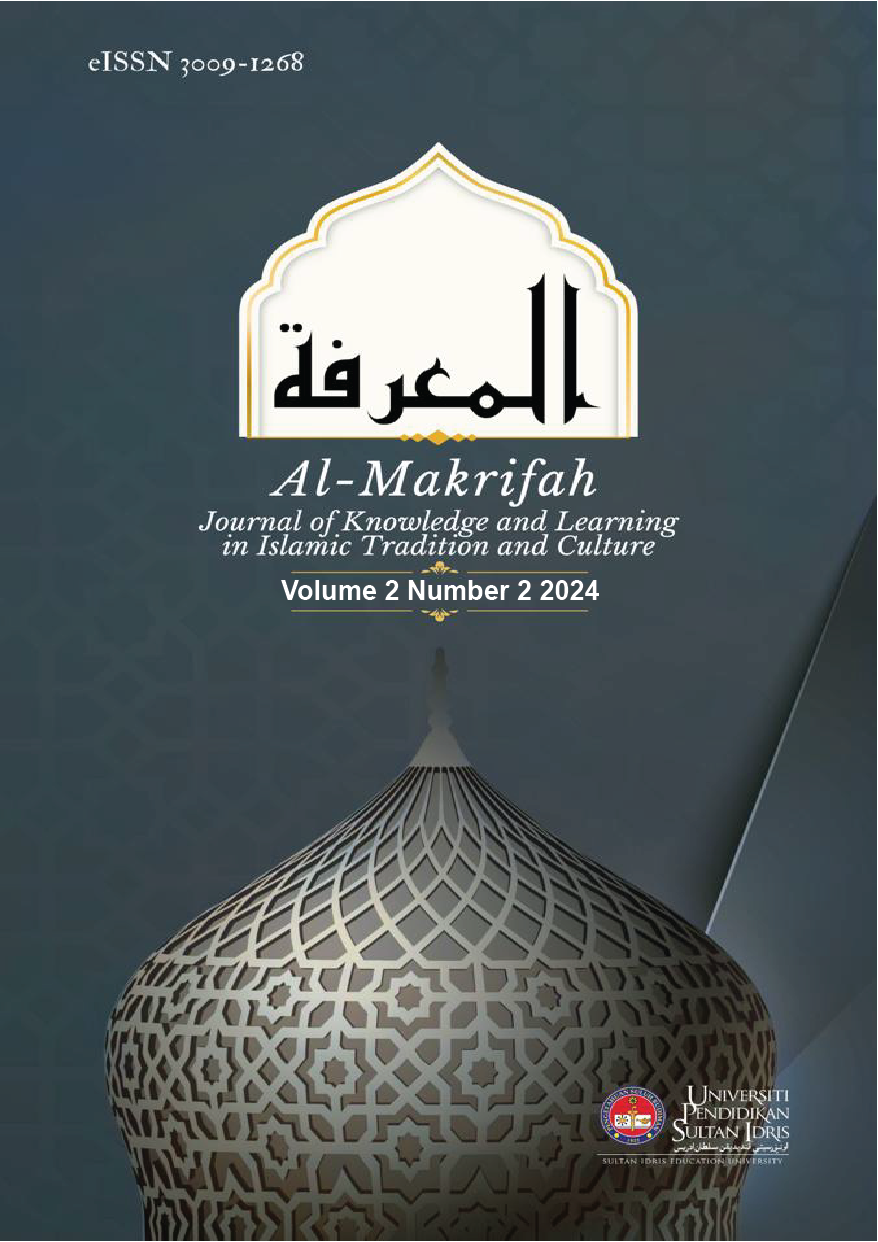Hamka and the Rise of Kaum Muda (the Modernist) in Indonesia
DOI:
https://doi.org/10.37134/almakrifah.vol2.2.5.2024Keywords:
Hamka, Muhammad Abduh, Tafsir al-Azhar, Reform, ModernistAbstract
The paper aims to study the historical background of the Islamic reform movement in West Sumatera with particular reference to the idea of Haji Abdul Malik Karim Amrullah or his pseudonym Hamka (1908-1981). His religious ideal was instrumental in driving the new consciousness and unprecedented religious struggle that erupted in the late 20th century in the Malay Archipelago, which reflected the force of modern ideas of Shaykh Muhammad Abduh (1849-1905) that had brought decisive and most significant influence in the region. The reform movement he inaugurated was carried out by Kaum Muda (the young faction) in the Malay Archipelago, who disseminated his dynamic ideas and aspirations through journals and newspapers such as Al-Imam, Al-Munir, and Saudara. One of the leading figures and pioneers in the struggle of Kaum Muda was Haji Rasul and Kiyai Haji Ahmad Dahlan, whose legacy was continued by Hamka, who was celebrated as the foremost advocate of Abduh’s reformist ideas through his influential writing and activity. Therefore, this research analyzes Hamka’s reputed struggle in leading this unprecedented religious movement for reform (islah) and renewal (tajdid) in the Malay world. This research aims to develop his legacy and monumental contribution to the Malay world's history and tradition of reform.
Downloads
References
Abdul Rahman Abdul Aziz. (2007). Pemikiran Etika Hamka. Kuala Lumpur: Utusan Publication & Distributors.
Abdul Rahman Abdul Aziz. (2009). Nilai Mencapai Kehidupan Sejahtera: Pandangan Hamka, Malim, 2(10), 123-144.
Md Sidin Ahmad Ishak. (2001). Pemikiran dan Perjuangan Hamka. Kuala lumpur: Angkatan Belia Islam Malaysia (ABIM).
Fadzilah Din (2003). The Contribution of Tafsir Al-Manar and Tafsir Al-Azhar Towards Understanding the Concept of Ta-ah and its Observance: A Theological Inquiry (Doctoral Thesis). University of Edinburgh.
Hamka (1954). Empat Bulan di Amerika. Djakarta: Tintamas.
Hamka (1957). Kenang-Kenangan Ku Di-Malaya. Singapura: Setia Darma.
Hamka (1958). Teguran Suci dan Jujur Terhadap Mufti Johor. Singapura: Persatuan Muhammadiyah Pusat.
Hamka (1961). Pengaruh Muhammad Abduh di Indonesia (Pidato diutjapkan sewaktu akan menerima gelar doctor honoris causa dari Universitas Al Azhar di Mesir pada tgl. 21 Djanuari 1958). Jakarta: Tintamas.
Hamka (1962). Ayahku. Jakarta: Djajamurni.
Hamka (1966). Tuan Direktur. Kuala Lumpur: Pustaka Antara.
Hamka (1970). Said Djamaluddin Al-Afghany: Pelopor Kebangkitan Muslimin. Jakarta: Bulan Bintang.
Hamka (1974). Kenang-Kenangan Hidup. Jakarta: Bulan Bintang.
Hamka (1982). Tafsir al-Azhar. 10 Jil. Singapura: Pustaka Nasional.
Hamka (2020). Angkatan Baru. Kota Depok: Gema Insani.
James R. Rush. (2016). Hamka’s Great Story: A Master Writer’s Vision of Islam for Modern Indonesia. Madison, WI: University of Wisconsin Press.
Khairudin Aljunied (2018). Hamka and Islam: Cosmopolitan Reform in the Malay World. New York: University of Cornell Press.
Milhan Yusuf (1995). Hamka’s Method of Interpreting the Legal Verses of the Qur’an: A Study of his Tafsir Al-Azhar (Master Dissertation). Institute of Islamic Studies, McGill University, Montreal.
Mohammad Hafiz Ahmad (2014). “Karya Nusantara Hamka” Kosmo, 6 Mei, 22-23.
Muhammad Hilmi Jalil, Fakhrul Adabi Abdul Kadir (2012). Comprehensive Human Development Through Physical and Spiritual: Studies on the Novel “Tenggelamnya Kapal Van Der Wijck,” Procedia - Social and Behavioral Sciences (55), 1118-1123.
Muhammad Jamil (1998). Hamka’s Views on Some Major Religio-Political Issues in Indonesia (Master Dissertation). Kulliyyah of IRKHS, International Islamic University Malaysia.
Rusydi Hamka. (1981). Pribadi dan Martabat Buya Prof. Dr. Hamka. Jakarta: Pustaka Panjimas.
Wan Sabri Wan Yusof. (1997). Hamka’s Tafsir Al-Azhar: Qur’anic Exegesis As a Mirror of Social Change (Doctoral Thesis). Temple University.
Steenbrink, Karel A. (1994). Hamka (1908-1981) and the Integration of the Islamic Ummah of Indonesia, Studia Islamika 1 (3), 119-147.
Downloads
Published
Issue
Section
License
Copyright (c) 2024 Ahmad Nabil Amir, Tasnim Abdul Rahman

This work is licensed under a Creative Commons Attribution-NonCommercial-ShareAlike 4.0 International License.





